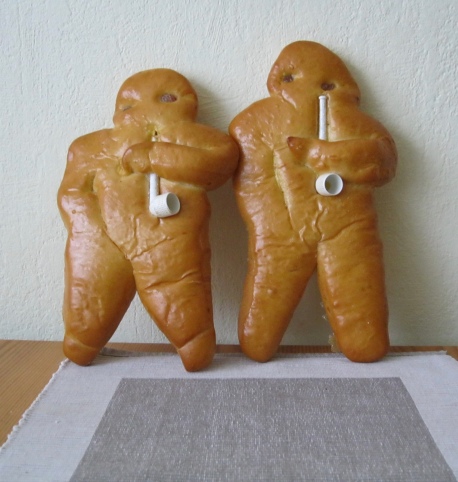The most powerful character in the world’s most famous fairy tale opera is neither Gretel nor Hänsel. It is food. Its vocabulary is everywhere.

Singers of Hänsel und Gretel! Rent a room, decorate it in part as witch house, in part as forest, and on a long table lay out all food that is mentioned in the libretto. If there is still space have a piano and a stool for the accompanist, perform Hänsel und Gretel with all your talent, sing and in between act out the verbs of devouring. At the end open the buffet and invite the audience to help themselves. It will be a feast.
In no other opera do the minds of the characters spin so fiercely around food and eating. The obsession that unites all characters, the good ones and the evil, the obsession with food and the lack thereof will not leave the story for a second. When it comes to the range of culinary vocabulary, Hänsel und Gretel is in the opera repertoire without a rival.* Adelheid Wette’s libretto, set into music by her brother Engelbert Humperdinck, contains more than 50 different words and phrases around food. Here are some of them.
der Eierfladen (or Pfannkuchen) = pan cake. Here, in this compound noun the emphasis is on Eier (eggs, singualar: das Ei) as a sign that we are well off right now.
trocken Brot = “dry bread”, Brot ohne Butter, Käse oder Wurst. This phrase which we use also today (Ich lebe nur von Liebe und trocken Brot) reveals that we are not well off right now.
der Butterwecken = Wecken mit Butter gebacken. A Wecken is a southern word for a wedge-shaped roll baked with wheat and butter.
das Mehl = flour. Wir machen Kuchen und Brot aus Mehl, Butter, Eiern und Milch.
der Rahm = Auf der Milch ist der Rahm.
die Sahne = Rahm whipped until it becomes stiff. Ein Vanille-Eis mit Sahne bitte!
der Brei = mush, porridge. Reisbrei = Brei made from rice
die Wurst = sausage, plural: die Würste
der Speck = bacon
die Bohne = bean, plural: die Bohnen
die Zwiebel = onion, plural: die Zwiebeln
die Kartoffel = potato, plural: die Kartoffeln
der Likör aus Kümmel = caraway liquor
ein Viertel Pfund Kaffee = a quarter pound of coffee.
At the hut of the Knusperhexe we find sweet food.
der Zucker = sugar. Der Zucker macht das Essen süß.
die Torte = also mentioned as Kuchen, gefüllt mit süßer Sahne
der Kuchen = mentioned in various forms, e.g. Lebkuchen (gingerbread), Zauberkuchen
der Teig = Before it is put into a Backofen what will be a Kuchen is der Teig.
die Rosine = raisin
Schokolade and Marzipan are self-explanatory.
die Dattel = date, plural: die Datteln.
das Johannisbrot = carob, fruit of a Mediterranian tree
das Jungfernleder = an herb
Now, the verbs:
kochen
schlucken = to swallow
schmecken = to taste. Das schmeckt gut! That’s really tasty.
nagen = to nibble like a rabbit
naschen = the way you eat a little bit secretely, mostly sweets. Naschen implies fun. When you discover that a little finger had go through a creamy cake you left on the table, you ask your child, “Wer hat hier genascht?” (genascht: past participle of naschen)
knuspern = (old) to munch mostly nuts and cookies
schleckern = to eat candies, to lick on ice-cream, or whipped cream
verschleckern = to eat all candies, all ice-cream, all whipped cream in the jug
Verbs of eating with incredible enjoyment:
schmausen = to eat food that is available in abundance, the table bending under its weight.
sich laben an (reflexiv + dative) = to refresh and enjoy yourself with great food and drinks. Ich labe mich an der Schokoladentorte.
sich ergötzen an (reflexiv + dative) = to take great pleasure of eating food
füttern = to feed
mästen = to fatten. Although the word mästen is used for fattening animals, in this opera the Hexe intends to mästen Hänsel.
nudeln = to fatten up with pasta
* The opera was written in the early 1890s when the society was still coping with the upheaval of the industrial revolution. Machines had replaced manual labor. Crafts that flourished for centuries had become worthless over night. Hundreds of thousands were without work and eventually without food. Everybody in these times who watched Hänsel und Gretel understood the sufferings the characters displayed on stage.